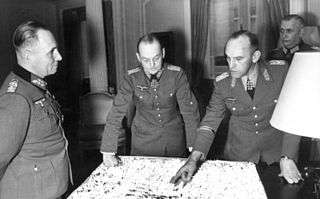Alfred Gause
| Alfred Gause | |
|---|---|
|
Gause (right), speaks with the commander, Italian General Enea Navarini (left) | |
| Born |
14 February 1896 Königsberg |
| Died |
30 September 1967 (aged 71) Bonn |
| Allegiance |
|
| Service/branch | Heer |
| Years of service | 1914–45 |
| Rank | Generalleutnant |
| Commands held |
LXVII. Armeekorps II. Armeekorps |
| Battles/wars |
|
| Awards | Knight's Cross of the Iron Cross |
Alfred Gause (14 February 1896 – 30 September 1967) was a highly decorated Generalleutnant in the Wehrmacht. He was wounded in the First World War, and was awarded both the Iron Cross, both Second and First Class. In the interwar years he was among the 4,000 officers selected to remain in the Reichwehr, the restricted sized German army. He served primarily on the staff of the First Prussian Engineer battalion.
During the Second World War he was a highly valued staff officer. Gause was initially sent to Africa with a large staff by Oberkommando des Heeres (OKH), the German Army High Command, to act as a liaison officer with the Italian High Command, Comando Supremo. Gause had specific instructions not to place himself under the command of Erwin Rommel, but did so when Rommel told him categorically that the command of all troops in Africa were vested in him. This was not correct, but Gause acceded to Rommel's authority, and served as his Chief of Staff.[1] He proved invaluable to the famous desert commander, who was well known to direct his forces from the front and who frequently would lose touch with his command staff during operations. Gause spent two and a half years serving Rommel in the Afrika Korps. Though initially sent by OKH to keep an eye on the independent commander, they soon developed an excellent working relationship. In December, 1941 Gause was awarded the Knight's Cross of the Iron Cross. The Knight's Cross of the Iron Cross was awarded to recognise extreme battlefield bravery or successful military leadership. In early May 1943 he was rotated into the officer reserve force, and thus was off the continent when the Axis forces in Africa surrendered.

Gause rejoined Rommel in his postings in Italy and Northern France. In September 1944 he became Chief of Staff of the 6th Panzer Army, which he held through the end of November. In April he was assigned to Generalkommando II Armeekorps in Kurland (General staff of Army Corps, Kurland). Alfred Gause was captured by Soviet troops in the Courland Pocket in 1945 and was a prisoner of the Soviets until his release in 1955.
Awards and decorations
- Iron Cross (1914) 2nd Class & 1st Class
- Iron Cross (1939) 2nd Class & 1st Class
- Panzer Badge in Silver
- Knight's Cross of the Iron Cross on 13 December 1941 as Generalmajor and Chef der Generalstab Panzer Gruppe "Afrika"[2]
- Wehrmacht Long Service Award, 4th to 1st class
References
Citations
Bibliography
- Fellgiebel, Walther-Peer (2000) [1986]. Die Träger des Ritterkreuzes des Eisernen Kreuzes 1939–1945 — Die Inhaber der höchsten Auszeichnung des Zweiten Weltkrieges aller Wehrmachtteile [The Bearers of the Knight's Cross of the Iron Cross 1939–1945 — The Owners of the Highest Award of the Second World War of all Wehrmacht Branches] (in German). Friedberg, Germany: Podzun-Pallas. ISBN 978-3-7909-0284-6.
- Lewin, Ronald (1968). Rommel As Military Commander. New York: B&N Books. ISBN 978-0-7607-0861-3.
- Scherzer, Veit (2007). Die Ritterkreuzträger 1939–1945 Die Inhaber des Ritterkreuzes des Eisernen Kreuzes 1939 von Heer, Luftwaffe, Kriegsmarine, Waffen-SS, Volkssturm sowie mit Deutschland verbündeter Streitkräfte nach den Unterlagen des Bundesarchives [The Knight's Cross Bearers 1939–1945 The Holders of the Knight's Cross of the Iron Cross 1939 by Army, Air Force, Navy, Waffen-SS, Volkssturm and Allied Forces with Germany According to the Documents of the Federal Archives] (in German). Jena, Germany: Scherzers Militaer-Verlag. ISBN 978-3-938845-17-2.
| Military offices | ||
|---|---|---|
| Preceded by General der Infanterie Walther Fischer von Weikersthal |
Commander of LXVII. Armeekorps 1 June 1944 - 7 June 1944 |
Succeeded by General der Infanterie Walther Fischer von Weikersthal |
| Preceded by General der Infanterie Dr. rer. pol. Dr.-Ing. Johannes Mayer |
Commander of II. Armeekorps 1 April 1945 - 8 May 1945 |
Succeeded by None |
